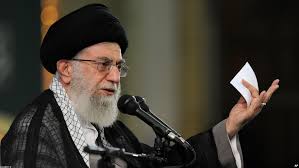
Iranian Supreme Leader Ayatollah Seyyed Ali Khamenei has categorically rejected any negotiations with the United States concerning Iran’s nuclear program and defense capabilities, declaring that such talks would not serve national interests, the Iranian News Agency (IRNA) reported on Tuesday, September 23, 2025.
In a statement reflecting Tehran’s hardline stance, Khamenei accused Washington of attempting to dictate the terms of dialogue to force a complete halt to uranium enrichment and missile development.
He stressed that Iran will not yield to US pressure, highlighting the nation’s resilience in the face of external attempts to undermine its unity.
“Throughout history, the cohesion of the Iranian people has thwarted the enemy’s objectives during imposed wars,” Khamenei said, noting that the country’s diverse ethnic groups form a “fist of steel” united against adversity.
On the nuclear issue, the Supreme Leader confirmed that Iran has achieved a 60% enrichment capacity, describing it as a “very high and very good” level that satisfies the country’s energy and scientific needs. He reaffirmed that Tehran has no intention of acquiring a nuclear weapon, but emphasized that its right to enrichment—a critical technological capability—cannot be destroyed by external attacks.
Khamenei also underlined Iran’s position as one of only ten countries worldwide with such enrichment capabilities. He warned that negotiating under duress would constitute “submission” and could invite further demands from foreign powers.
The Supreme Leader additionally paid tribute to the memory of fighter Seyyed Hassan Nasrallah, calling him a “precious treasure” for the Islamic world and an invaluable figure in regional defense efforts.
Khamenei’s remarks mark a continuation of Iran’s defiant posture toward the United States, amid ongoing international concerns over nuclear proliferation and regional security. By ruling out negotiations, he signals Tehran’s determination to maintain its strategic programs while resisting external influence.
This declaration is likely to impact diplomatic efforts aimed at de-escalating tensions and reviving talks over nuclear compliance and defense limitations in the region.



